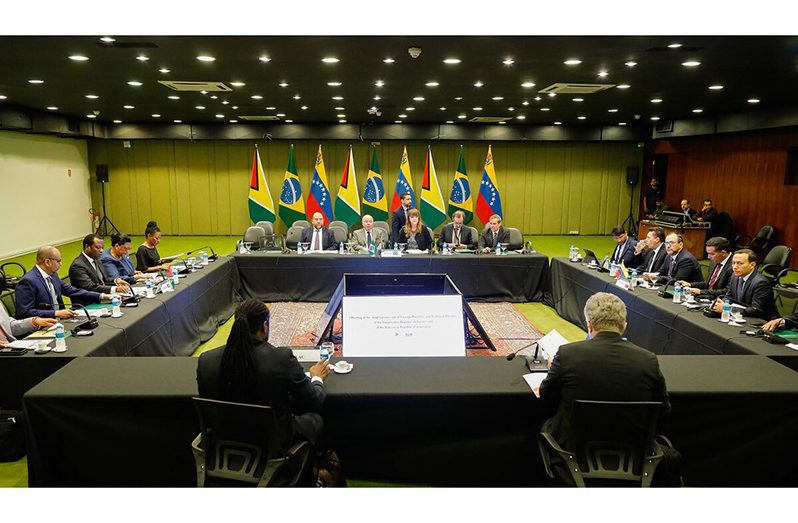– President Ali says in response to questions on Venezuela expanding military presence near border
GUYANA’S primary concern remains the safety and security of its citizens and its economic zone and as such, the country continues to foster relationships with its regional and international partners, President Dr. Irfaan Ali has said.
The Guyanese Head of State was at the time responding to questions during an interview with six-time Emmy Award-winning Television Producer Arick Wierson for Newsweek Magazine, in the United States of America (USA).
“[We] are pursuing a path in which we have asked Venezuela to be [a] partner and upholder of international law and to respect the ICJ [International Court of Justice] and the outcome of the ICJ,” he said, when asked about recent satellite images showing the expansion of Venezuelan troops near the country’s border.
“Our primary concern is the safety and security of our citizens, our investment and everything that is our territorial space; our sovereign space and our exclusive economic zone and that is why we believe we are pursuing a path of diplomacy,” he added.
According to President Ali, the images are dated and are in fact from the “high tension period.”
“At the same time we are not naïve. At the same time we have launched an aggressive programme of strengthening our partnership with allies of the modernisation of our defence system, the investment in technology, investment in the training of our human resources, the building of capacity and the integration of what we are doing with our allies,” President Ali added.
Guyana he said has been working with both its regional and international partners to maintain a peaceful region. These include, the Caribbean Community (CARICOM), the United Kingdom, France, Brazil, and the United States of America (USA).
Through these partnerships, Guyana has been working to build a robust mechanism of co-operation and integrate formally an approach and joint commitment in ensuring the region remains peaceful.
Last month, Guyana’s Foreign Affairs Minister, Hugh Todd, led a delegation to Brazil where a meeting was held with Venezuelan officials.
President Ali had said that the continued conversations between the two nations will set the stage for another scheduled meeting with himself and his Venezuelan counterpart Nicolas Maduro in keeping with the Argyle Declaration, an 11-point agreement that outlines a pledge from both countries to refrain from escalating the decades-old border controversy among the two states.
In December, the two Heads of States met in St. Vincent & the Grenadines. The meeting was facilitated by the Prime Minister of St. Vincent and the Grenadines, Ralph Gonsalves, and observed by Brazil, CARICOM, and a UN Under-Secretary-General.
This historic meeting culminated in what is now known as the “Argyle Declaration,” an 11-point agreement that addresses matters consequential to the border controversy, including the fact that Guyana stands firm in its position that the substantial case is before the International Court of Justice (ICJ).
GENESIS OF THE BORDER CONTROVERSY
The genesis of the border controversy goes back to the 1899 Arbitral Award, a landmark decision that delineated the land boundary between British Guiana (now Guyana) and Venezuela.
Despite the historic arbitration, tensions have persisted, with Venezuela repeatedly challenging the validity of the award.
In 2018, Guyana took a decisive step by approaching the International Court of Justice (ICJ) seeking affirmation of the award’s legitimacy.
Venezuela initially claimed that the ICJ lacked jurisdiction, a contention flatly rejected by the World Court in a crucial ruling in December 2020. The door was thus opened for the ICJ to delve into the merits of the substantive case.
HOW DID WE GET TO THE ARGYLE DECLARATION?
Prior to the meeting of the two South American leaders, Venezuela’s President held a Referendum on December 3, which was seen and feared to be a gateway for the Spanish-speaking nation to further fortify its claims to two-thirds of Guyana’s territory, the Essequibo region.
With tensions rising, a meeting was arranged for the two leaders to meet.
According to a recent press release from Guyana’s Ministry of Foreign Affairs, the country remains fully committed to the principles of the Argyle Declaration, in particular the maintenance of peace in Latin America and the Caribbean.



.jpg)










